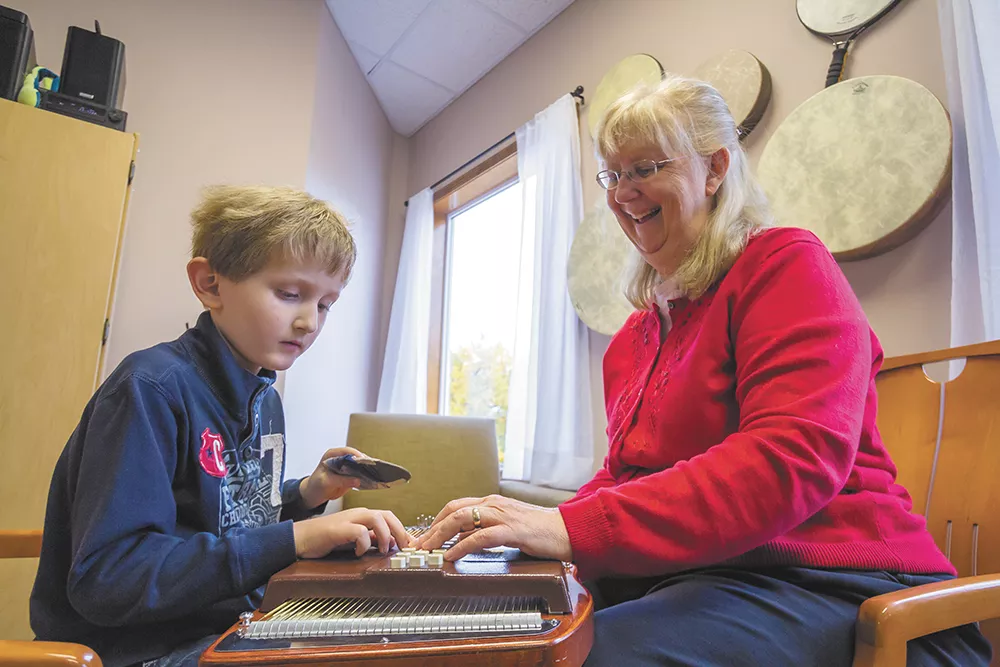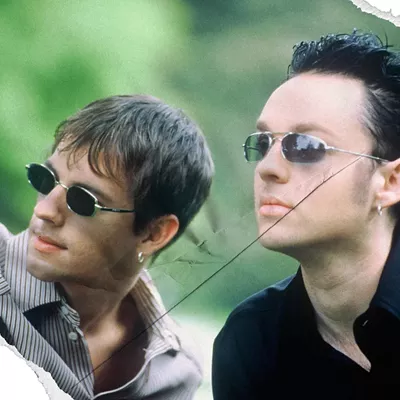For those who visit music therapists like Kim McMillin, music can heal. Inside McMillin's South Hill office, the walls are painted a calming shade of lavender, and the room is filled with musical instruments — tools she uses to help her clients reach their full potential.
"Music is powerful," says McMillin, one of three practicing, board-certified music therapists in Spokane.
It can help children cope with wide variety of issues — autism spectrum disorders, Down syndrome, depression, anxiety, stress and social skills.
The American Music Therapy Association defines it as the clinical and evidence-based use of music interventions to address physical, emotional, cognitive and social needs of individuals and accomplish goals within a therapeutic relationship by a credentialed professional. McMillin also is a licensed mental health counselor and registered nurse.
"Music organizes the brain," she says. "That's essentially what I'm doing here — I'm helping them organize the brain." The goal of music therapy isn't to teach music, but rather to use it as a technique to boost sensory-motor and cognitive skills, as well as language, problem solving and impulse control.
Through singing, listening, moving and playing, "You can use music not only to calm, but to focus," McMillin says.
Music therapists also can work in conjunction with others, such as occupational therapists.
"We may be focusing on the same goal, but come at it from a different angle, using music to reach that certain goal," says McMillin. And reaching a goal is a big part of therapy.
"Success is a huge thing, the feeling of success," says Carla Carnegie, another music therapist serving the Inland Northwest. "And that's what we're doing with any of these things. It increases success, which is motivating to anybody, child or adult. We all want to feel successful."
Therapists are equipped to adapt music therapy to those with special needs. Adaptive mallets with straps can help a child with low muscle tone, for example.
Both Carnegie and McMillin caution parents to beware of those claiming to be so-called sound healers, who are not board-certified therapists, and stress that music therapy is different than music for entertainment. Like other types of therapy, music therapists perform an assessment, create a treatment plan and continuously evaluate. For some, treatment terminates when they reach a goal; for others, it's appropriate to have ongoing treatment.
"Music therapists have many tools in their toolbox that we can pull out, depending on the needs of the client," says Carnegie, who takes her mobile practice to clients' homes. "We're engaging them in music because the brain that is engaged in music is changed in music."
Carnegie, a neurologic music therapist, says music "lights up the brain."
"Music is processed globally," she says. "When we are talking, our language and speech areas are firing, but when we're engaging in music, the whole, entire brain is active."
Music's ability to "light up the brain" is evidenced in the robust body of research showing numerous positive outcomes of music education for all kids: enhanced learning, a better understanding of advanced mathematical concepts and improved test scores, among others.
A 10-year study, tracking more than 25,000 students, showed that music students earn higher marks on standardized tests than those with no music involvement, regardless of socioeconomic background.
There are social benefits, too. Students who participate in a school band have the lowest levels of current and lifelong use of alcohol, tobacco and illicit drugs.
Ben Brueggemeier, band instructor at Ferris High School for 19 years, agrees that there are many side benefits to music education, but he hopes never to minimize the intrinsic value of music itself. "I think a lot of times, when people get into what music does for kids, they get caught up in how it can make their science and test scores better," he says. "I think that's true, but I would hate to think that's the reason why kids are doing music."
Music is deeply personal, speaking to kids' creative, emotional side and encouraging self-expression, he says. "I think kids are doing music because they love it. I think it helps us reach a side of us that doesn't get reached in other classes as much."
At the same time, music students often form deep bonds with their peers as they spend years practicing and performing together as they move from grade to grade. "There is that bond," Brueggemeier says. "There is that family. There's a sense of safety in that, and then, of course, there's the musical accomplishment of what they can do." ♦
For babies and younger children, programs like Kindermusik, which has classes for children from birth to 7 years old, strive to encourage a love of music from a young age, while also fostering child development.
"The kids just feel like they're having this wonderful, delightful time," says Kindermusik instructor Teresa Birch. "But in reality, the activities come together to help the children grow in every area of development ... It doesn't ever feel like tons and tons of work. It feels like joy."
Birch offers these suggestions to help parents incorporate music into everyday life:
- Break out the pots and pans and a wooden spoon to let small children explore percussive sound, or fill various containers with things like dry rice or beans to make different-sounding rattles.
- Dance to music with scarves or streamers.
- Create songs to go with the day's rituals — snack time, bath time or bedtime, for example.
- Rock and sing to babies. Babies recognize and love the sounds of their caregivers' voices. "Any time we're singing and speaking to babies, their wonderful brains are seeking patterns very early on, from the moment they're born," Birch says.
- Parents can gently caress their baby and draw a heart on baby's tummy while they speak or sing to them. "So much benefit comes from that touch," Birch says. "And eye contact, too. What they're hearing is 'I love you, my darling child. You are my treasure, you are my jewel.'"
— CHELSEA BANNACH
Music classes for children and teens also can be found at spokanecity.org. Information on Kindermusik is at kindermusikfun.net. Music therapist Kim McMillin uses instruments and singing to help young clients boost their sensory-motor and cognitive skills. |jeff ferguson photo



















